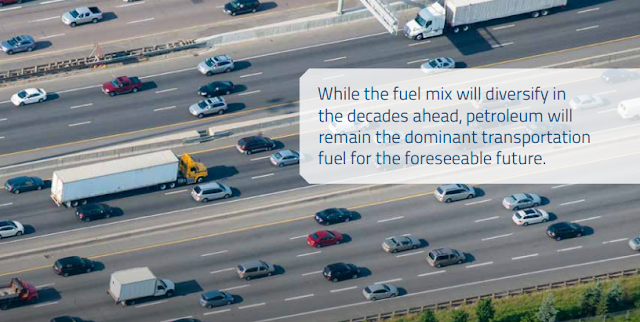A long road ahead
By: Peter Boag, President and CEO of the Canadian Fuels Association
Article was originally published in the Canadian Fuels Association 2015 Annual Report - Perspectives - and can be found here: http://canadianfuels.ca/assets/upload/pdf/en/Publications/SectorReview-EN_web.pdf
Article was originally published in the Canadian Fuels Association 2015 Annual Report - Perspectives - and can be found here: http://canadianfuels.ca/assets/upload/pdf/en/Publications/SectorReview-EN_web.pdf
 |
| Canadian Fuels Association 2015 Annual Report - Perspectives |
Driving towards a sustainable transportation system that balances Canadians’ environmental, economic and social aspirations
Governments at all levels are increasingly
focused on the issue of climate change.
The 21st Session of the Conference of the
Parties to the United Nations Framework
Convention on Climate Change (COP21),
scheduled for Paris in the first half of
December 2015, may be a defining
moment in charting the road forward.
An aggressive target
The Intergovernmental Panel on Climate
Change has determined that keeping
the global temperature increase to within
two degrees Celsius will require GHG
emission reductions of 80 percent below
1990 levels by 2050. A new Canadian
report explores that challenge in detail.
The Conference Board of Canada’s A Long,
Hard Road: Drastically Reducing GHG
Emissions in Canada’s Road Transportation
Sector by 2050 takes into account the most
promising initiatives and technologies. It
finds that an 80 percent reduction target
for Canada is unrealistic. Converting all
passenger transportation to zero emission
modes would still leave Canada well short
of this goal. Even a 50 percent reduction
target will be costly and require not only
a significant reduction in transportation
activity, but also a break in the traditional
connections between economic growth,
our standard of living and transportation
demand.
The Conference Board report highlights
the difficulty for policy-makers: transportation
is a significant component of
emissions in Canada and around the
world. Transportation is also vital for a
strong economy and decent quality of
life. How can we achieve meaningful
emissions reductions without compromising
our ability to travel and
constraining our economy?
Targets are essential. But they must be
realistic and set in conjunction with clear,
practical plans on how to achieve them.
An aggressive aspirational target in the
absence of such strategy is a formula for
failure. Kyoto is a good example.
Progress is being made
Rather than dwell on unachievable
targets, we feel it is helpful to focus on
the environmental progress that’s being
made (Breathing Easier, page 32) and the
many ways we can make a difference
now (eco-driving techniques, page 26).
The carbon footprint of transportation
will get smaller in coming years, but
short of some new and as yet unknown
technological breakthrough, incremental
technology developments will deliver
some of the most beneficial contributions
(Fuelled by Innovation, page 22). While
the fuel mix will diversify in the decades
ahead, petroleum will remain the
dominant transportation fuel for the
foreseeable future.
Beyond this, demand-side management
is the key challenge and opportunity.
Canadians and governments must make
smart decisions about where we live and
work, how we get around, and how much
we are prepared to pay for our transportation
options (see Get Smart, page 12).
The goal is to grow a sustainable
transportation system that balances
Canadians’ environmental, economic
and social aspirations.
We believe combined efforts to achieve
this sustainable outcome must be
founded on three key actions:
- Explore, define and evaluate emission reduction pathways in collaboration with stakeholders before targets are set.
- Recognize Canada’s productivity and competitiveness as core considerations in the development and implementation of a national GHG reduction strategy.
- Ensure that sound science and cost-benefit analyses drive decisionmaking and are transparently shared with citizens.
Our industry fuels mobility. We are
committed to working constructively
together with governments and other
stakeholders to achieve a sustainable,
lower-carbon transportation future
for Canada.
Perspectives is an important part of our
contribution. This annual publication
gathers clear and balanced insights from
academics, researchers, independent
journalists and industry experts to provide
Canadians with the knowledge they need
to make informed decisions about our
transportation fuels future. Perspectives
carries on the Canadian Fuels Association’s
active role in the public discourse
on Canada’s transportation fuels.
Our members are not responsible for setting targets. But, as Canadians, we are all responsible for helping governments set realistic ones and exploring the ways we can work successfully toward them.
Our members are not responsible for setting targets. But, as Canadians, we are all responsible for helping governments set realistic ones and exploring the ways we can work successfully toward them.

Comments
Post a Comment